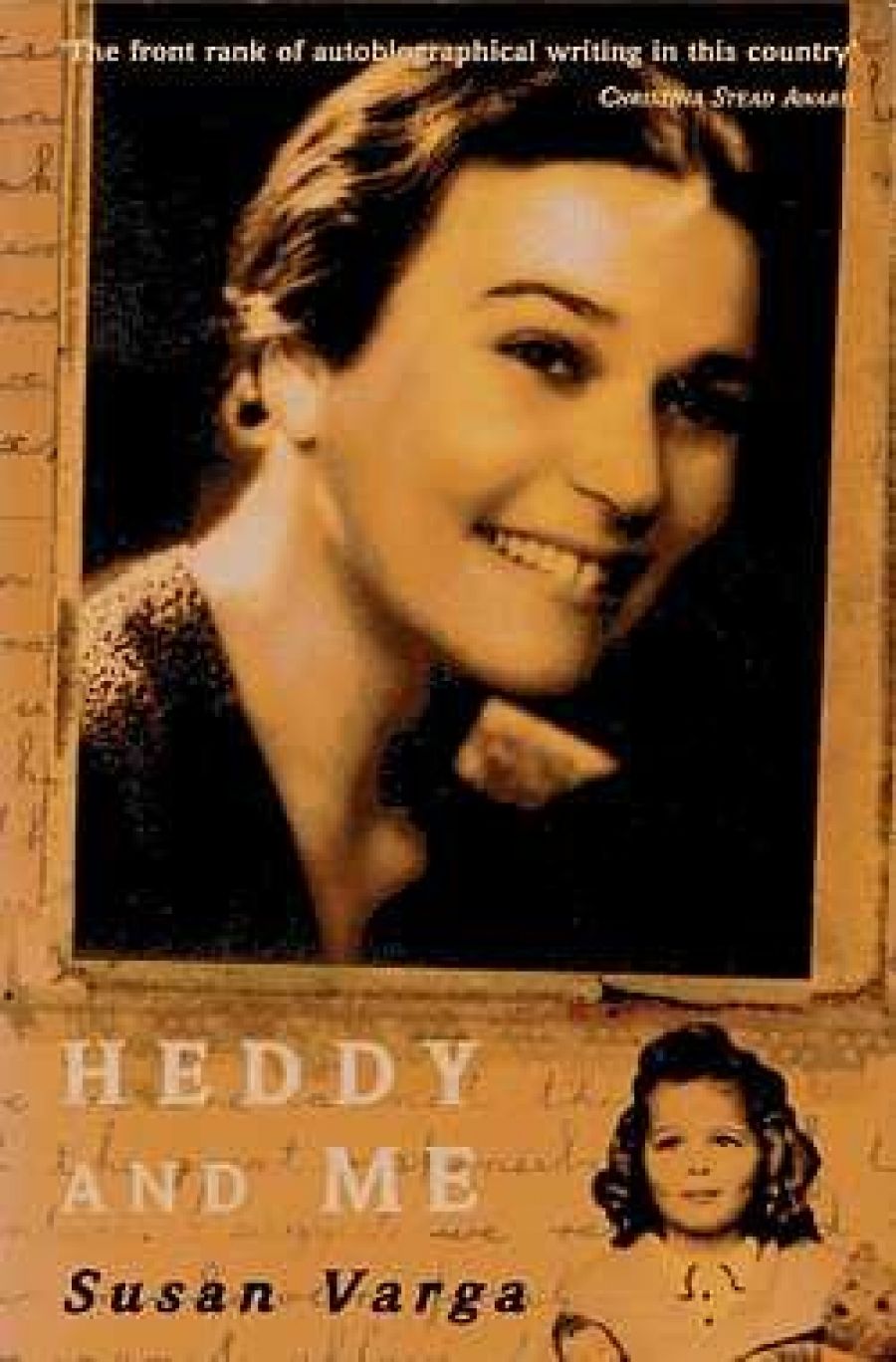
- Free Article: No
- Contents Category: Memoir
- Review Article: Yes
- Online Only: No
- Custom Highlight Text:
Heddy is a survivor. She is good looking, intelligent, strong, determined, businesslike, materialistic, positive, rather like those formidable Middle-European ladies who run dress shops and control their customers with a mixture of bullying and continental charm. She has tremendous vitality, guts and initiative, has taken great risks and worked hard to ensure freedom from fear and material security for herself and her family.
- Book 1 Title: Heddy and Me
- Book 1 Biblio: Penguin, $16.95 pb
She has come from hedonistic pre-war Buda Pest, a bourgeois world of velvet curtains, chandeliers, opera, cafes and rich cakes. Her first husband has died in a labour camp; with her tough, valiant mother, Kato, and her two babies, Jutka and Susan, she has survived the terrors and horrors of Jewish persecution, weeks of hiding, cold, hunger, squalor, rape and its consequences, nightmare journeys across country. In 1949, with her children and second husband, a labour camp survivor, she arrives in Sydney, ‘brown and drab, its buildings haphazard and unlovely, its people closed in, stiff ... the women dowdy ... the rankness everywhere of mutton and dripping’.
With money smuggled out of Hungary the emigres start again – a dress factory, Hollywood Handbags, fish shop, a house in Chatswood. As fortunes improve, there is a Holden car, Chatswood becomes Lane Cove, then Killara, finally Bellevue Hill where Heddy can hang the chandeliers and arrange the furniture brought from Hungary.
While the adults are battling for a life of ‘stability, predictability and prosperity’, Susan, the ‘me’ of the book’s coy and clumsy title is growing up. On the surface her life is uneventful Australian but inwardly it is turmoil and conflict. She feels she doesn't really belong here. She never knew her father and though she has a kind and affectionate stepfather and lives in comfort and security she is haunted by barely conscious memories of fear and horror. In a confused way she feels the burden of her parents’ past suffering and is guilty because she has not shared it.
As well, she and her sister resent ‘having to appreciate everything... And Mother, in turn, resented the very trouble-free life she had created for us. We failed to see our life from her perspective.’ That life has been so unlike Heddy’s that Susan has no understanding of her mother's insistence on order, her passion for possessions, her desire for her daughter to be ‘normal’ and live a conventional life. People who love each other don't always get on together. After clashes, Susan leaves home, to avoid being ‘trapped in the world of obedient Jewish boys destined to be come doctors’.
It is not till she is working on this book and is in Buda Pest with her mother among their Hungarian relations, retracing the settings of Heddy’s past, that there is a real rapprochement and she comes to see her mother’s point of view, to appreciate her indomitable courage, to understand the significance to her of material possessions, to realise that those who have been brutally displaced and dispossessed may need to recreate their lost background as reassurance, not only of security but of their own identity.
Relations with Heddy are also improved by Susan’s response to Buda Pest, the emergence of her Hungarianness. At first she is critical of the dirt and shabbiness of the battered old city but is gradually seduced by its personality and memories in the blood. She understands why friends don’t envy her life in Australia, why they say, ‘It’s a mess here...but it’s a damn sight more interesting than Sydney’. She becomes one more Australian with a heart on each side of the globe.
Though Heddy cooperated with her daughter in this book and her story is faithfully told, somehow at the end one doesn’t really know her beyond her obvious positive qualities. She is seen as the determined survivor, the successful achiever, the devoted family protector who never seems uncertain, lost, despairing, defeated. She must have had such moments but she appears almost invulnerable, invincible. One admires her but doesn’t feel close to her. Susan, the confused introverted second generation emigree, writing about herself from the inside, is more accessible; so too is her picture of Kato, the much-loved grandmother, even the shadowy father who gave up and died and whose last days his daughter tries to uncover. But Heddy, the resourceful heroine, keeps her distance, revealing only what she wants us to see.


Comments powered by CComment